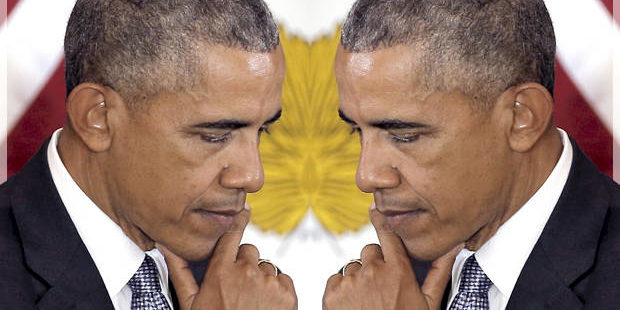
The two Obamas: An assessment of our capable, but captive president
Obama’s obscuring of the truth about his drone program tarnishes otherwise strong legacy on human rights
Not long ago I had the president of our great country down as a conundrum or an enigma or a Hamlet or a hypocrite—or any combination of these or all four. One way or another, a hard read. Dearly did I wish his name offered some useful music such as to suggest a phrase comparable to the immortal “Tricky Dick.” Nothing doing. Neither “Barack” nor “Hussein” nor “Obama” brings forth any serviceable poetry.
But who and what this president is comes clearer, it seems to me, in the waning days of his presidency. I first twigged to this on the occasion of Obama’s extraordinary appearance at the African Methodist Episcopal Church in Charleston after the June 17 murders last year. Finally, our first black president could speak eloquently and forcefully as a black man and stand ready to take on all comers.
That was the president those who voted for him intended to elect eight years ago. Remember his acceptance speech? I do, vividly, although I was living in Hong Kong at the time. When Obama referenced the great Sam Cooke with the phrase, “It’s been a long time coming,” I heard a man who understood text and subtext and knew how to make use of both.
Then came the badly mixed record, especially in foreign policy. And then came the questions. Who is this guy? He cuts a deal with Iran and then sets about defrauding them. He opens to Cuba with the idea America will have its way there yet. Some monstrous political sharp? Some neoliberal Trojan horse? The cleverest-yet front for the Pentagon and the spooks with his bombing campaigns and weapons programs, his crummy reforms after the Snowden revelations, the assassination list he peruses weekly in the Oval Office?
It will take our better historians to sort the man out, but I now propose a credible version of what they are likely to find. He is the smartest man to occupy the White House in who knows how long; Bill Clinton is a wet ball of papier mâché by comparison. He is a person of principle, even if one of these is an exceptionalist’s faith in neoliberal economics—for which, curses. And at bottom he is a captive—a prisoner of our invisible government. In this he proves a revelatory test of just how extensive has been our Deep State’s long, silent coup and how powerful its operatives have become over the past seven decades.
This president gets done what he can, usually on the domestic side — a lesser interest among the military-defense contractor-intelligence cliques. But in matters of overseas policy he is high school, as we used to say. He caves and justifies at every turn, or most, because the only alternative (as I am told he himself reckons) is to risk the fate of the Dulles-defying JFK.
If this take is anything near correct, it leaves us with something very large to think about. A lot of us acknowledge we no longer live in a democracy. In Obama we glimpse just how frightening is the America we have let the powerful and the paranoid make. It is as if Orwell and Terry Southern co-wrote a script for Stanley Kubrick, except it is far too late for satire.
*
I urge readers to reflect upon two recent events with this admittedly speculative analytic construct in mind. They occurred back to back, like a pair, as these things have often seemed to be during Obama’s White House years. Each is worth considering in its own right, but together they return more than the sum of parts.
Late last month, alert readers will recall, Obama designated the Stonewall Inn in Greenwich Village, site of the storied confrontation between gay New Yorkers and the police in 1969, a national monument. The event got some coverage; Obama’s remarks got next to none. Nobody considered his speech for its larger implications — but then, very few journalists are capable of properly analyzing anything that truly matters.
“The story of America… is written by ordinary people who put their shoulders to the wheel of history,” Obama began. Then a list: “Farmers and blacksmiths… immigrants… women… scientists… the preachers, and porters, and seamstresses…”

